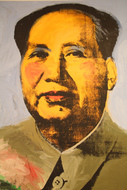 In college, I had the good fortune to take a seminar taught by a man who had lived an extremely interesting life. The seminar was on twentieth-century China, and the professor had witnessed it to a degree very few people could claim. His name is Sidney Rittenberg. For years, he was the only American citizen allowed into the inner circle of power in Communist China, spending 37 years there after World War II, 16 of which were spent imprisoned. His book, "The Man Who Stayed Behind" is one of my all-time favorites. As a 19 year old I couldn't appreciate the very large truths Professor Rittenberg related in his book. But as I grew older, they became more evident. He's told me that I'm not the only one who's told him they got more mileage out of his book after taking his class than during it. May 16 was the 50th anniversary of the start of the Great Proletariat Cultural Revolution, a counter-revolution that was called "China's Holocaust" by former president Li Xiannian. It ended only when its founder, Chairman Mao Zedong died in the fall of 1976. It was an attempt to make the Communist Party great again by purging it of elements he defined as antithetical to what the Party was - e.g., capitalism, tradition, bourgeois elements, art - anything that did not fit their ill-defined view. How did he do this? In part, by galvanizing the youth, to smash the old Communist Party he himself had forged, and recreate it in his own image. This was Mao's way of regaining supreme leadership after his widely derided failures during the earlier disaster of the Great Leap Forward. So he raised slogans to "Smash the Four Olds" (Old Customs, Old Culture, Old Habits, and Old Ideas). The world was divided into black and white: anything belonging to the "Four Olds" became the object of intense hatred and sanctioned violence. Mao succeeded perhaps past his own expectations. By raising slogans like "It is right to rebel!" or "No construction without destruction!" or "Revolution is not a dinner party!" he encouraged violence and class warfare. People's revolutionary spirit would be measured by the degree to which they would report on their fellow citizens. If someone was caught reading literature, that was something that should be reported. Artistic expression was frowned upon, and the so-called hong wei bing - Red Guards (Chinese Taliban?) would set upon buildings, furniture, items that were "merely" decorative, art pieces, styled hair, non-cadre clothing, to "cleanse" society to remove any trace of what they defined as the "Four Olds." Children denounced their parents, husbands their wives. Millions of people were persecuted, harassed, tortured, exiled, and killed. Professor Rittenberg himself went along with the Cultural Revolution. He gives an honest, first-hand account of what it was like, believing in a greater good. But he admits he misunderstood the point of the Cultural Revolution. The point was to create a revolution against the original Communist Party revolution - and debate, criticize, elect, discuss, and vote - but only within guidelines set by Chairman Mao himself. That oversight cost Professor Rittenberg 10 additional years in solitary confinement. He now sees Mao as a "brilliant, talented tyrant," responsible for the death and suffering of millions of people. You'd never know what he's been through: he has all the approachability of your own grandpa, except interspaced in his stories about olden times are truth bombs that leave craters in your mind. He was recently interviewed by Washington China Watch on the occasion of the 50th anniversary of the Cultural Revolution (downloadable pdf here.) China has officially acknowledged that the Cultural Revolution was a mistake, but there has been relative silence in Chinese media on the occasion of its 50th anniversary. But the point should be obvious by now. The vitriol of our current election cycle bears more than a scant resemblance to the Cultural Revolution. I'm not saying they are the same - there are differences in both objective and execution. But the similarities are hard to ignore. A cult of personality around strongman candidates who can dish it out all day but can't take it back for a minute. Promises to solve massive social problems. The celebrity status of the leaders, who claim to represent the "proletariat" (working man) but have never belonged to the 99%. The raising of slogans hearkening back to a time of perceived purity. The narrative of foreign elements and classes tainting a "pure" society. Calls encouraging violence against these identified enemies by, say, offering to pay their legal bills. Activating a long-disregarded "underbelly" of society, empowering them, validating their simplistic worldview. "If you see something, say something." Ultimately, I think the Cultural Revolution was about control. I think Professor Rittenberg's takeaways from the Cultural Revolution - in which he participated in, and also was imprisoned for - are important takeaways for this election cycle as well. I can't say it better than him, so: The painful lesson here is that mistaken ideology can produce thoughtless cruelty in gentle, kind-hearted people...The most important lesson from the Cultural Revolution is to stay away from ideological blindness, from playing “follow the leader” wherever you are led, to think independently, critically, and not to believe in overnight miracles of social engineering.
2 Comments
Leave a Reply. |
AuthorHassan Ahmad, Esq. Archives
June 2018
Categories
All
|
 RSS Feed
RSS Feed